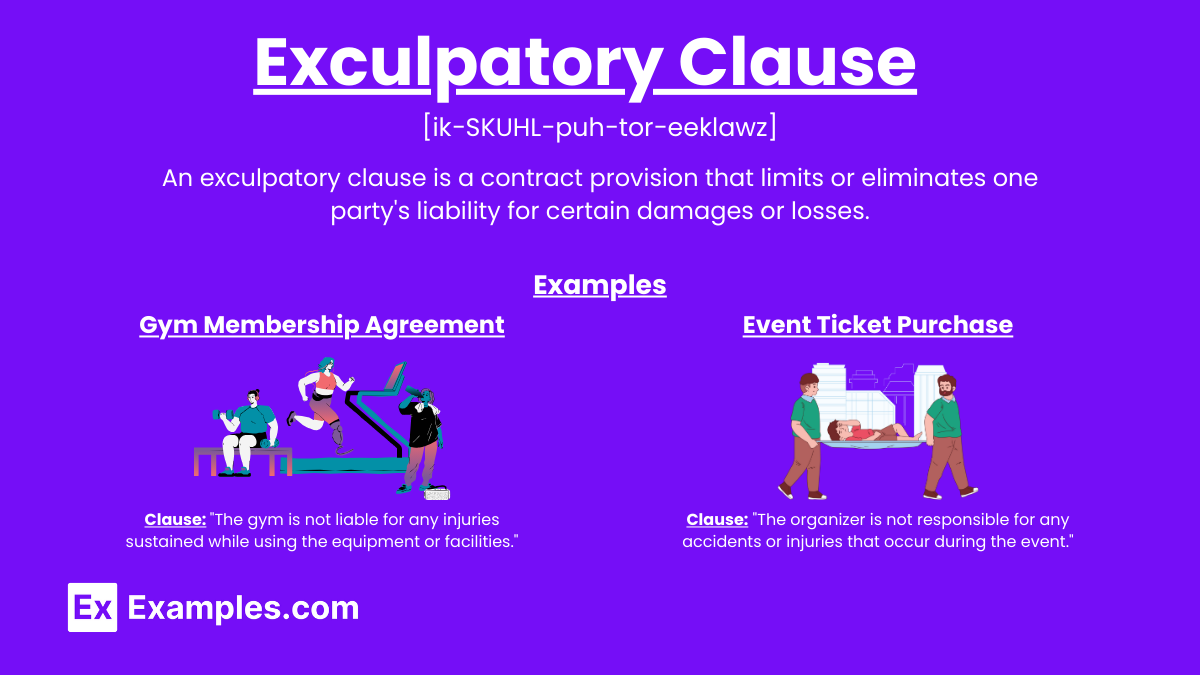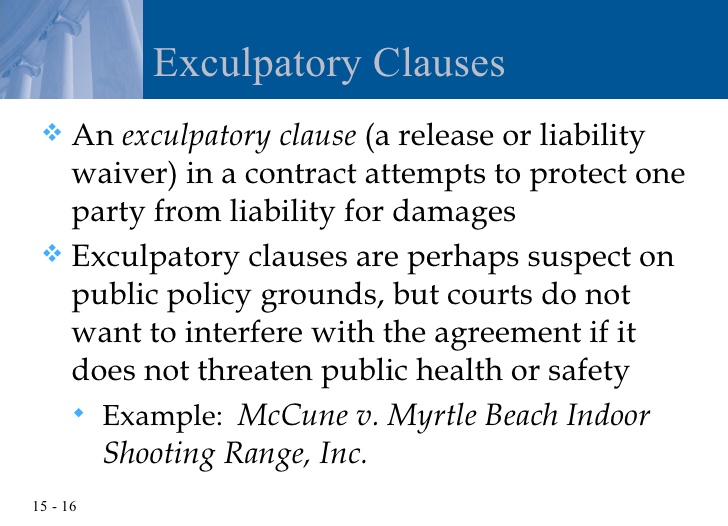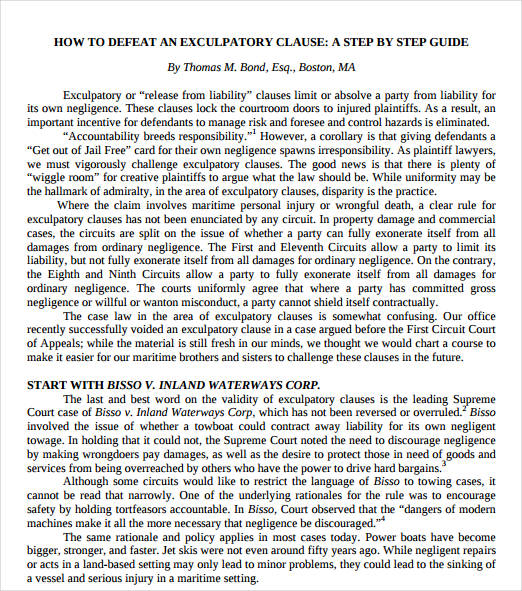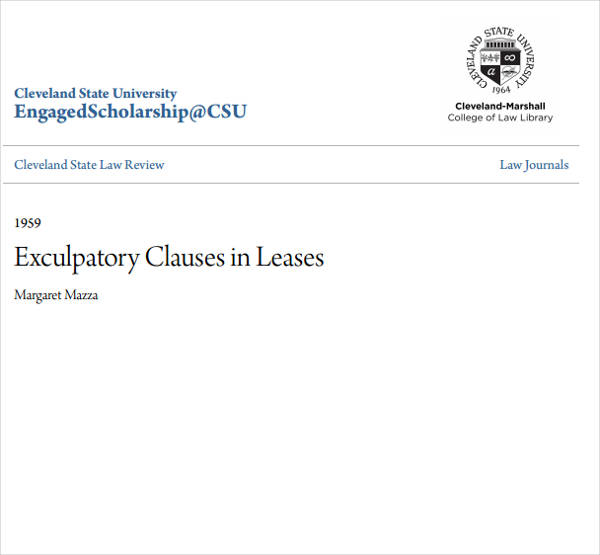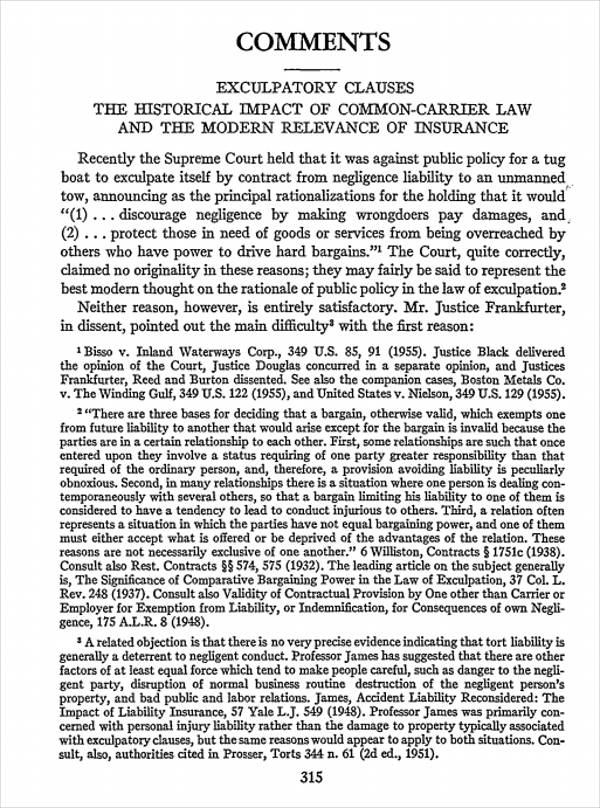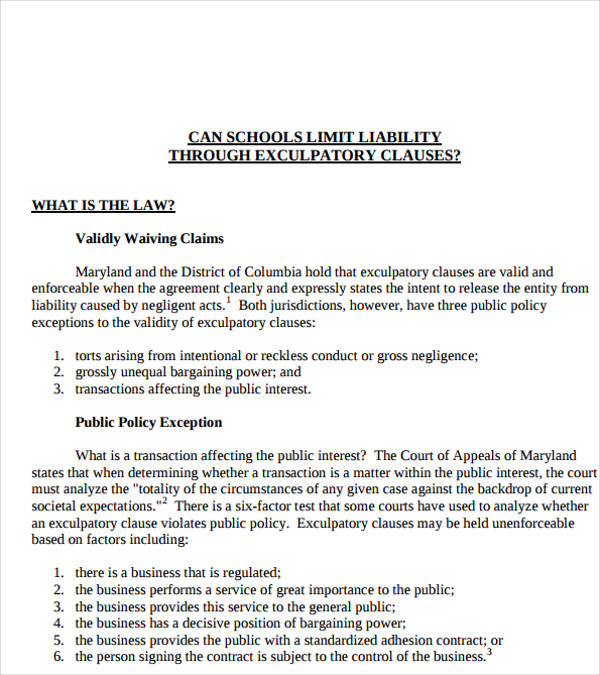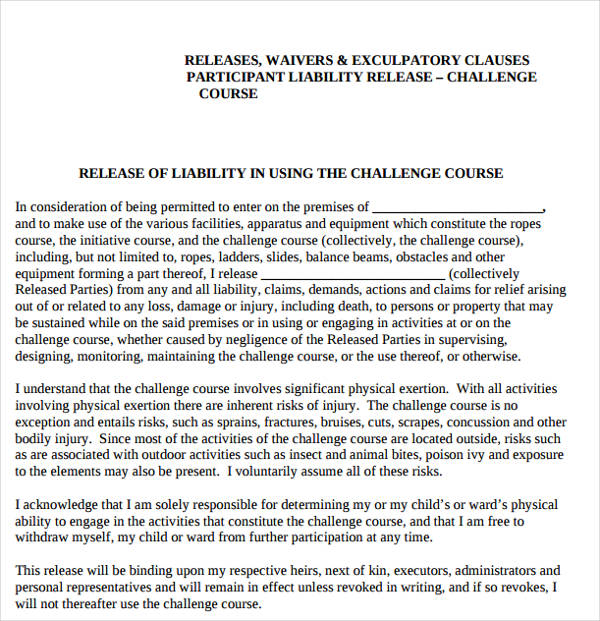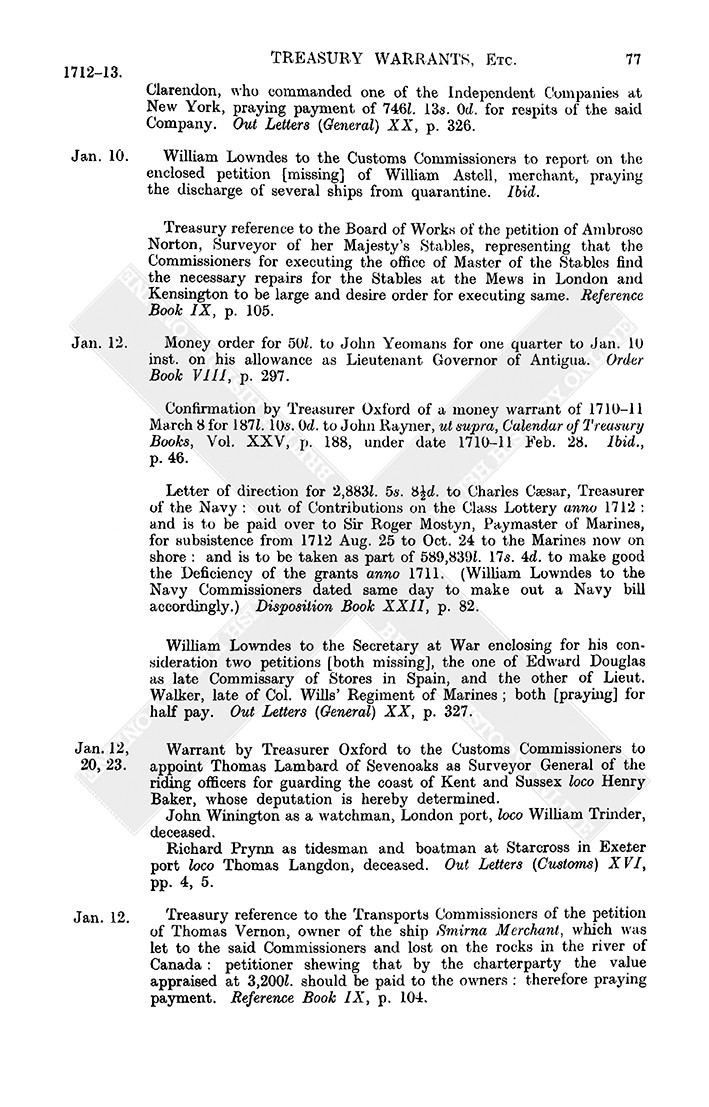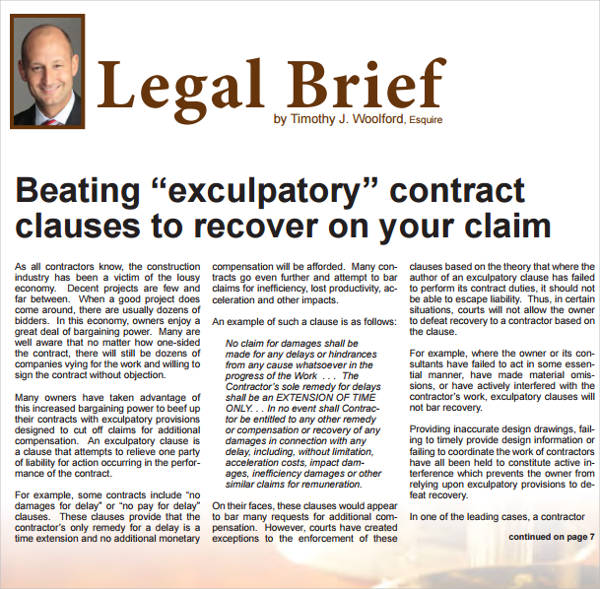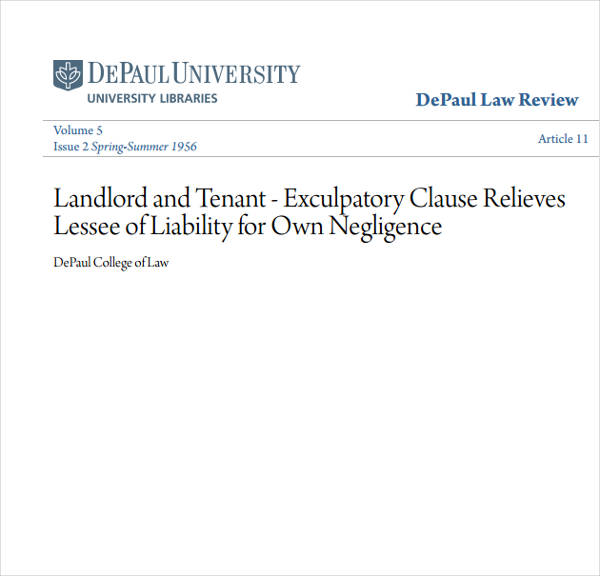50+ Exculpatory Clause Examples
An exculpatory clause is a provision in a general contract that relieves an individual of any liability should there be any damages that may occur within the duration of the execution of the contract. Typically, the contract party who issues an exculpatory clause is the one who wants to be relieved of any potential responsibility that may arise in the future.
- Independent Clause Examples (with Worksheet Samples in PDF)
- 3 Key Differences between Unilateral and Bilateral Contracts
What Is an Exculpatory Clause?
An exculpatory clause is a contract provision that relieves one party from liability for harm or damages caused during the execution of the contract. It is commonly used in service agreements, leases, and liability waivers. These clauses must be clearly stated and cannot protect against gross negligence or intentional misconduct.
Types of Exculpatory Clauses
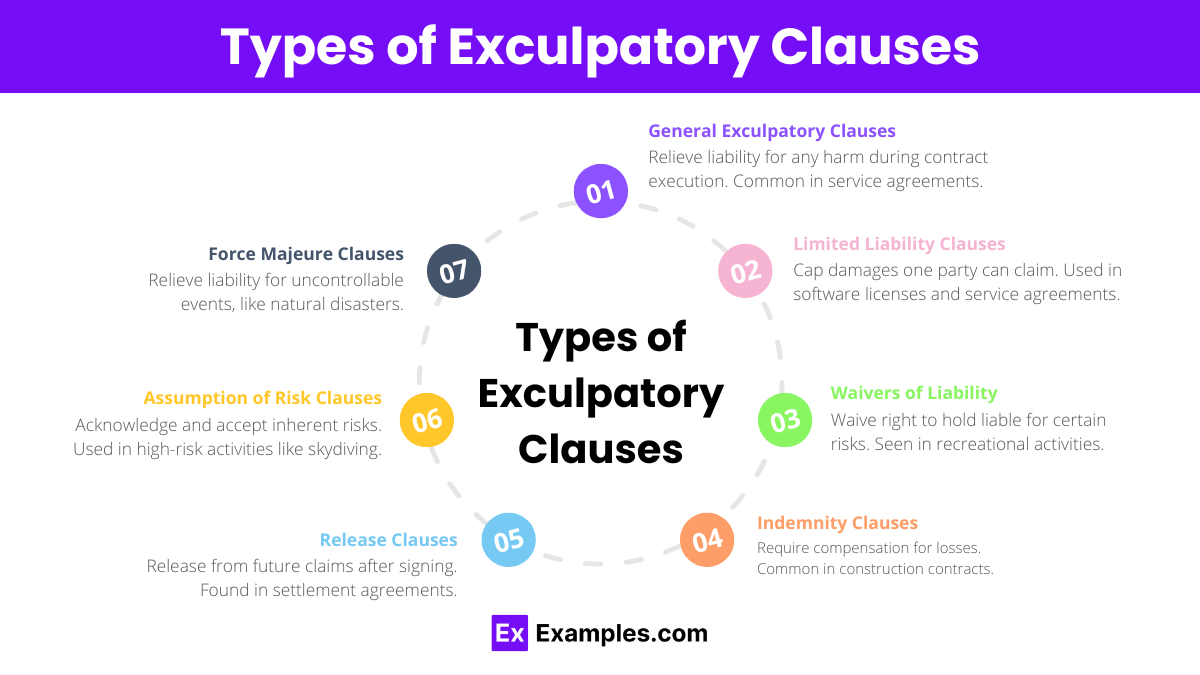
Exculpatory clauses are contractual provisions that release one party from liability for harm or damages caused by their actions or negligence. These clauses are commonly used in various types of agreements to limit or eliminate liability. Here are different types of exculpatory clauses:
1. Waiver of Liability
- A clause where one party agrees to waive the right to hold the other party liable for any harm or damages.
- Example: “The participant waives all rights to sue the event organizers for any injuries sustained during the event.”
2. Hold Harmless Agreement
- A clause where one party agrees to protect the other party from any claims or lawsuits that may arise from their actions.
- Example: “The contractor agrees to hold harmless the homeowner from any claims arising out of the contractor’s work.”
3. Assumption of Risk
- A clause where one party acknowledges the risks involved in an activity and agrees to assume responsibility for any harm that may occur.
- Example: “The skier acknowledges the inherent risks of skiing and assumes all responsibility for any injuries that may occur.”
4. Limitation of Liability
- A clause that limits the amount or types of damages one party can recover from the other party.
- Example: “The service provider’s liability for any claims arising from this contract is limited to the amount paid for the services.”
5. Indemnification Clause
- A clause where one party agrees to indemnify and compensate the other party for any losses, damages, or legal fees resulting from specific actions or events.
- Example: “The tenant agrees to indemnify the landlord for any damages caused by the tenant’s negligence.”
6. Release Clause
- A clause where one party releases the other party from any future claims or liability related to a specific matter.
- Example: “The employee releases the employer from any claims related to the termination of employment.”
7. Disclaimer of Warranties
- A clause that denies any express or implied warranties regarding the goods or services provided.
- Example: “The software is provided ‘as is,’ without any warranties of any kind.”
8. Exclusion of Consequential Damages
- A clause that excludes liability for consequential, indirect, or incidental damages.
- Example: “The company shall not be liable for any consequential damages arising from the use of its products.”
9. Force Majeure Clause
- A clause that excuses one or both parties from liability or obligation when an extraordinary event or circumstance beyond their control occurs.
- Example: “Neither party shall be liable for any failure to perform due to events beyond their control, such as natural disasters or war.”
10. Exculpatory Clause in Real Estate
- A clause in a lease or sale agreement that limits the landlord’s or seller’s liability for certain conditions of the property.
- Example: “The landlord is not responsible for any damages to the tenant’s personal property stored on the premises.”
Examples of Exculpatory Clause:
Exculpatory Clause in a Mortgage Agreement
Exculpatory clauses in mortgage agreements are designed to limit the lender’s liability and protect them from certain risks. Here are a few examples:
1. Non-Recourse Clause:
- “The borrower agrees that, in the event of a default, the lender’s recourse will be limited to the property securing the mortgage and not to the borrower’s other assets.”
2. No Personal Liability Clause:
- “The borrower shall not be personally liable for any deficiency remaining after foreclosure and sale of the property.”
3. Waiver of Claims Clause:
- “The borrower waives any and all claims against the lender for any actions taken in connection with the enforcement of the mortgage.”
4. Indemnification Clause:
- “The borrower agrees to indemnify and hold the lender harmless from any claims, damages, or losses arising out of any hazardous substances found on the property.”
5. Assumption of Risk Clause:
- “The borrower acknowledges and assumes all risks associated with any decline in the value of the property.”
6. Release of Liability Clause:
- “Upon transfer of the property, the borrower releases the lender from any future claims related to the mortgage or the property.”
7. Hazardous Substances Clause:
- “The borrower assumes all responsibility for any environmental cleanup costs or legal liabilities associated with hazardous substances on the property.”
8. Property Maintenance Clause:
- “The borrower agrees to maintain the property in good condition and indemnifies the lender against any claims resulting from property neglect or disrepair.”
9. Insurance Requirements Clause:
- “The borrower must maintain adequate property insurance, and the lender is not liable for any damages exceeding the insurance coverage.”
10. Default Interest Clause:
- “In the event of a default, the borrower agrees that any unpaid amounts will accrue interest at the default rate, and the lender is not liable for any resulting financial hardship.”
Exculpatory Clause Examples in Business
Exculpatory clauses are common in business contracts to limit liability and define the responsibilities of parties involved. Here are some examples:
1. Service Agreement Clause:
- “The service provider shall not be liable for any damages arising from the use of the service, including but not limited to loss of profits, data, or business opportunities.”
2. Lease Agreement Clause:
- “The landlord shall not be responsible for any injuries or damages occurring on the premises due to the tenant’s actions or negligence.”
3. Event Contract Clause:
- “The event organizer is not liable for any injuries or accidents that occur during the event, and participants attend at their own risk.”
4. Construction Contract Clause:
- “The contractor shall not be liable for any delays or damages resulting from unforeseen circumstances, such as weather conditions or material shortages.”
5. Sale of Goods Clause:
- “The seller disclaims all warranties, express or implied, including any warranties of merchantability or fitness for a particular purpose.”
6. Software License Agreement Clause:
- “The licensor is not responsible for any data loss or system failures resulting from the use of the licensed software.”
7. Consulting Agreement Clause:
- “The consultant shall not be liable for any business decisions made based on their advice or recommendations.”
8. Employment Contract Clause:
- “The employer shall not be liable for any personal injury or property damage that occurs to the employee while off duty or outside of the workplace.”
9. Venue Rental Agreement Clause:
- “The venue owner is not liable for any damages or losses incurred by the renter or their guests during the rental period.”
10. Transportation Services Clause:
- “The transportation provider shall not be responsible for any delays, accidents, or losses that occur during transit, except in cases of gross negligence.”
Exculpatory Clause in Real Estate
Exculpatory clauses in real estate contracts help limit the liability of landlords, sellers, and other parties involved in property transactions. Here are some examples:
1. As-Is Clause:
- “The buyer agrees to purchase the property ‘as-is,’ with no warranties or representations made by the seller regarding the condition of the property.”
2. Non-Recourse Clause:
- “In the event of a default, the lender’s recourse shall be limited to the property securing the mortgage and not to the borrower’s other assets.”
3. No Warranty of Habitability Clause:
- “The landlord makes no warranty as to the habitability or condition of the premises and shall not be liable for any damages resulting from defects or repairs.”
4. Waiver of Claims Clause:
- “The tenant waives any claims against the landlord for personal injury or property damage occurring on the premises, except in cases of gross negligence.”
5. Indemnification Clause:
- “The tenant agrees to indemnify and hold the landlord harmless from any claims, damages, or losses arising out of the tenant’s use of the property.”
6. Hazardous Materials Clause:
- “The buyer assumes all responsibility for any environmental cleanup costs or legal liabilities associated with hazardous materials found on the property.”
7. Release of Liability Clause:
- “Upon transfer of the property, the buyer releases the seller from any future claims related to the property’s condition or title.”
8. Maintenance and Repair Clause:
- “The tenant is responsible for maintaining the property in good condition and shall not hold the landlord liable for any maintenance-related injuries or damages.”
9. Security Deposit Clause:
- “The landlord shall not be liable for any interest on the security deposit, and the tenant waives any claims to such interest.”
10. Insurance Requirement Clause:
- “The tenant must maintain adequate renter’s insurance, and the landlord is not liable for any damages exceeding the insurance coverage.”
Exculpatory Clause in Construction
Exculpatory clauses in construction contracts help manage risk and limit the liability of parties involved in construction projects. Here are some examples:
1. Delay Clause:
- “The contractor shall not be liable for any delays caused by unforeseen circumstances, including but not limited to weather conditions, supply shortages, or strikes.”
2. Indemnification Clause:
- “The subcontractor agrees to indemnify and hold the general contractor harmless from any claims, damages, or losses arising out of the subcontractor’s work on the project.”
3. Waiver of Consequential Damages Clause:
- “The owner waives any right to claim consequential damages, including lost profits or business interruptions, resulting from delays or defects in the construction.”
4. Force Majeure Clause:
- “The contractor shall not be liable for any failure to perform due to events beyond their control, such as natural disasters, acts of terrorism, or governmental actions.”
5. Limitation of Liability Clause:
- “The contractor’s liability for any claims arising out of this contract shall be limited to the contract price, and the contractor shall not be liable for any indirect or incidental damages.”
6. Warranty Disclaimer Clause:
- “The contractor disclaims all warranties, express or implied, including any warranties of merchantability or fitness for a particular purpose, except as explicitly stated in this contract.”
7. Safety and Risk Clause:
- “The owner acknowledges the inherent risks of construction activities and agrees to hold the contractor harmless for any injuries or damages occurring on the site, except in cases of gross negligence.”
8. Assumption of Risk Clause:
- “The owner assumes all risks associated with any hazardous materials discovered on the property and agrees to indemnify the contractor for any related claims or cleanup costs.”
9. Change Order Clause:
- “The contractor shall not be liable for any additional costs or delays resulting from changes in the scope of work requested by the owner.”
10. Site Conditions Clause:
- “The contractor shall not be liable for any unforeseen site conditions, including subsurface conditions, that may affect the project’s cost or timeline.”
Exculpatory Clause on Receipts
Exculpatory clauses on receipts help businesses limit their liability for issues that may arise after a transaction. Here are some examples:
1. No Returns Clause:
- “All sales are final. No returns or exchanges will be accepted.”
2. Warranty Disclaimer Clause:
- “The company disclaims all warranties, express or implied, including any warranties of merchantability or fitness for a particular purpose.”
3. Damage Limitation Clause:
- “The company is not liable for any damages, including indirect or incidental damages, arising from the use of purchased products.”
4. Assumption of Risk Clause:
- “The customer assumes all risks associated with the use of the product, including any potential health or safety hazards.”
5. No Liability for Loss Clause:
- “The company is not responsible for any loss or damage to personal property during or after the purchase.”
6. Service Disclaimer Clause:
- “The company is not liable for any issues arising from services provided by third-party contractors.”
7. Refund Limitation Clause:
- “Refunds, if any, will be limited to the original purchase price and will be issued at the company’s discretion.”
8. Payment Responsibility Clause:
- “The customer is responsible for ensuring all payment information is accurate and complete. The company is not liable for any payment processing errors.”
9. Event Cancellation Clause:
- “In the event of a cancellation, the company is not responsible for any costs incurred by the customer beyond the refund of the ticket price.”
10. Limitation of Claims Clause:
- “Any claims against the company must be made within 30 days of purchase. After this period, the company will not consider any claims.”
Generic Exculpatory Clause
Exculpatory Clause:
“The ABC Company shall not be held liable for any direct, indirect, incidental, special, or consequential damages, including but not limited to, loss of profits, revenue, data, or use, incurred by XYZ Client or any third party, whether in an action in contract or tort, arising from the use of or inability to use the products or services provided by ABC Company, even if ABC Company has been advised of the possibility of such damages. XYZ Client agrees to indemnify and hold ABC Company harmless from any claims or demands, including reasonable attorneys’ fees, made by any third party due to or arising out of XYZ Client’s use of the services, violation of this agreement, or infringement by XYZ Client, or other users of the services using XYZ Client’s computer, of any intellectual property or other right of any person or entity.
Furthermore, ABC Company makes no warranties or representations about the accuracy or completeness of the content provided and assumes no liability or responsibility for any errors, mistakes, or inaccuracies of content. The services and products are provided ‘as is’ and ‘as available’ without any warranties of any kind, either express or implied, including, but not limited to, the implied warranties of merchantability, fitness for a particular purpose, and non-infringement.
This clause shall apply to the fullest extent permitted by applicable law and shall survive termination of this agreement.”
More About Exculpatory Clause:
Exculpatory Clause Definition
How to Defeat an Exculpatory Clause Example
Example of Exculpatory Clauses in Leases
General Exculpatory Clause Example
Schools Limit Liability Exculpatory Clause Example
Releases, Waivers & Exculpatory Clauses
Exculpatory Clauses in Rental Agreement
Exculpatory Contract Clause Example
Landlord and Tenant Exculpatory Clause Example
Purpose of Exculpatory Clause
An exculpatory clause is a contract provision designed to limit the liability of one party in the event of damages or losses. Here are the primary purposes of an exculpatory clause:
1. Risk Management:
- Exculpatory clauses help manage risk by clearly defining the extent of liability each party is willing to assume. This can prevent unexpected legal and financial consequences.
2. Protection Against Lawsuits:
- These clauses protect businesses and individuals from being held liable for certain types of harm or damages, reducing the likelihood of costly lawsuits.
3. Clarification of Responsibilities:
- By outlining specific scenarios where liability is limited, exculpatory clauses clarify the responsibilities and expectations of each party involved in the contract.
4. Encouragement of Business Activities:
- Knowing that liability is limited can encourage businesses to engage in activities or provide services they might otherwise avoid due to potential legal risks.
5. Insurance Supplement:
- Exculpatory clauses can serve as a supplement to insurance policies, providing additional protection against claims that might exceed or fall outside the scope of coverage.
6. Contractual Fairness:
- These clauses ensure that all parties enter the agreement with a clear understanding of the risks involved, promoting fairness and transparency in contractual relationships.
7. Cost Control:
- By limiting liability, businesses can better predict and control potential costs associated with damages or legal disputes, aiding in financial planning and stability.
8. Legal Compliance:
- Properly drafted exculpatory clauses help ensure compliance with applicable laws and regulations, reducing the risk of legal penalties or invalidated contracts.
9. Encouragement of Personal Responsibility:
- Exculpatory clauses encourage individuals and businesses to take responsibility for their actions and decisions, fostering a sense of accountability.
Are Exculpatory Clauses Enforceable?
The general, unwritten rule tells us that exculpatory clauses are enforceable, even those that are not legally structured through standard contracts between a customer and a business, or a landlord and a tenant. However, historically, this has not always been the case.
The court used to frown upon this particular general clause since they firmly believed that people must be held responsible for wrongdoings that were done under their supervision. They believed that no one should be able to escape liabilities for a misconduct.
But times have changed and, depending on the state’s laws, exculpatory clauses are now respected by the court. But this clause does not make the party who issues it wholly insusceptible to blame since the clause has limitations. You may also like conditional sentence examples.
The Limitations of Exculpatory Clauses
As we’ve already discussed, exculpatory clauses are considered enforceable. Which means that if you lose your wallet in a public diner whose management has issued an exculpatory clause, you can force them to pay an equivalent amount of what you have lost. However, there are certain loopholes to this immunity. You may also see adjective clause examples.
1. If the exculpatory provision/clause is ambiguous.
Like every properly written contract, an exculpatory clause needs to be specific. It has to precisely state the rights that the person who agrees to the provision is waiving. There should be no space for questions or guesses within in the clause, in terms of language and conditions. The court will have to examine the clause anyway so that ambiguity can be removed, should there be any. You may also like dependent clause examples.
The main point is that the parties that will be affected by the exculpatory clause know exactly what they are getting themselves into and what rights they are renouncing.
2. If the loss or damage is caused by deliberate acts.
Of course the court will consider the root cause of the situation. If it was the product of gross negligence, willful actions, or simple utter disregard for the other party’s well-being, or anything similar, the court may invalidate the power of the clause. You may also check out adverb clause examples.
3. If the loss or damage is caused by fraudulent acts.
There may be instances wherein the situation is caused by an employee’s unlawful activity (such as theft), the court may choose to invalidate the exculpatory clause. But not all acts of deception can be considered a fraudulent act. For cases like that, the establishment in question may still be held liable but not because of fraudulent acts. You might be interested in relative clause examples.
A deed can only be considered fraudulent if the business has lied about an important detail in the transaction, the business has intended to deceive the customer by stating a false fact, the client relied on the false statement, and the client has experienced a loss or a damage because of reliance to the false statement. You may also see what is an example of a dependent clause?
4. If it contradicts public interest.
The court will take the interests of the public into a bigger consideration, so if the clause is against any public policy, the court can decline its enforcement. For these cases, the judge simply treats the clause as if it is not present in the document, and simply proceeds with the case. You may also like compound sentences – writing methods & examples.
Exculpatory Clause vs. Indemnity Clause
| Aspect | Exculpatory Clause | Indemnity Clause |
|---|---|---|
| Definition | Limits or eliminates liability for one party for specific circumstances. | One party compensates the other for certain costs and damages. |
| Purpose | To avoid liability and manage risk. | To transfer risk and cover specified losses. |
| Liability | Limits liability for the protected party. | Shifts liability to the indemnifying party. |
| Common Usage | Used in service agreements, rentals, event waivers, and purchase contracts. | Used in construction, service agreements, leases, and business contracts. |
| Scope | Restricts liability for specific actions or events, often excluding gross negligence or misconduct. | Covers losses, legal fees, and damages from third-party claims or breaches. |
| Responsibility | Avoids liability for specific outcomes. | Compensates for specified losses or damages. |
| Example Clause | “The provider is not liable for damages from use of the service.” | “The subcontractor indemnifies the contractor for claims from their work.” |
| Applicability | Applies to potential future claims and liabilities. | Applies to actual costs and damages incurred. |
| Enforceability | Must be clear and specific; often excludes gross negligence or intentional misconduct. | Generally enforceable if reasonable and clearly stated. |
What is an exculpatory clause?
An exculpatory clause limits or eliminates one party’s liability for damages or losses arising from specific circumstances in a contract.
Where are exculpatory clauses commonly used?
They are commonly used in service agreements, rental contracts, event waivers, purchase agreements, and real estate transactions.
Are exculpatory clauses enforceable?
They are enforceable if clearly stated, but they may not protect against gross negligence or intentional misconduct.
What is the main purpose of an exculpatory clause?
To manage risk and protect a party from being held liable for certain acts or omissions.
Can an exculpatory clause cover intentional misconduct?
Generally, exculpatory clauses cannot protect against intentional misconduct or gross negligence.
How should an exculpatory clause be drafted?
It should be clear, specific, and unambiguous to be enforceable.
Who benefits from an exculpatory clause?
The party seeking to limit their liability benefits from an exculpatory clause.
Can exculpatory clauses be challenged in court?
Yes, they can be challenged, especially if deemed unreasonable or against public policy.
What is an example of an exculpatory clause?
“The service provider shall not be liable for any damages arising from the use of the service.”
Do exculpatory clauses vary by jurisdiction?
Yes, the enforceability and scope of exculpatory clauses can vary depending on local laws and regulations.



